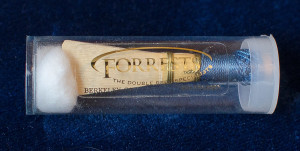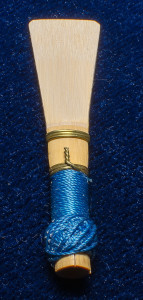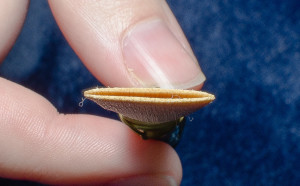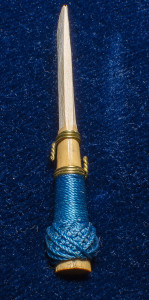My goal with these reeds reviews is to describe the reeds I feature as thoroughly as possible so that you, a bassoonist with a different instrument, elevation, embouchure, etc., can decide if these reeds are right for you.
I tested this Forrests Gold Label contrabassoon reed on January 25, 2016 in Rexburg, Idaho (elevation 4,865 ft). The temperature inside was 70° F and humidity was 32%. I tried the reed on a Fox contrabassoon.

This is a very popular contrabassoon reed. It’s inexpensive ($16-18) and comes from a well-known company. Most of the university student contrabassoon players I’ve spoken with have played on one before. But are the reeds any good?

The reed looks good and fit on my bocal nicely. When my students and I tested it for response, we were less impressed. The middle register responded well, but it was difficult to produce notes in the low register. It was even more difficult in the high register. 
Now that is a thick tip. No wonder our response tests returned poor results. When I played an F major scale, I was unable to make it sound like a major scale. Something wacky was going on with my middle D and my low F. (And it wasn’t the bassoon because I successfully tested another reed that same day.) A university student of mine said that he’s played on a number of these reeds over the past couple of years, and most of them have had this problem. Not good.
The intonation on this reed was a little high, although I couldn’t check all of my regular reference pitches because two of them didn’t come out as the right pitch.
- D in the staff: unable to test
- A at the top of the staff: 30 cents sharp
- Low F: unable to test
Contrabassoon reed tuning is difficult to pin down on account of the tuning slide. I’m afraid our intonation test didn’t provide very useful results with this reed.

As you can see from the photos, this is a thick, thick, reed. My students and I have played on these reeds successfully in the past, but they required A LOT of modification. Granted, this is a budget contrabassoon reed option (Forrests’ other contra reeds range in price from $20-36). I consider this more of a contra reed blank than I do a finished contra reed. It is not playable out of the box. Expect a good 45 minutes or more of work to get it playable.
Have you used Forrests contra reeds? What has your experience been like? Please comment below!
I have had similar issues as described. I spent considerable time adjusting (finishing) what I felt was an unfinished reed. Once my modifications were complete, it was a fine reed. The other issue to be addressed is their inconsistency. I bought 3 at the time, and found tip thicknesses to vary quite a bit and opening to be of various shapes (not symmetric).
The inconsistency is a real problem. I agree that they can be fine reeds–but they need a lot of work.